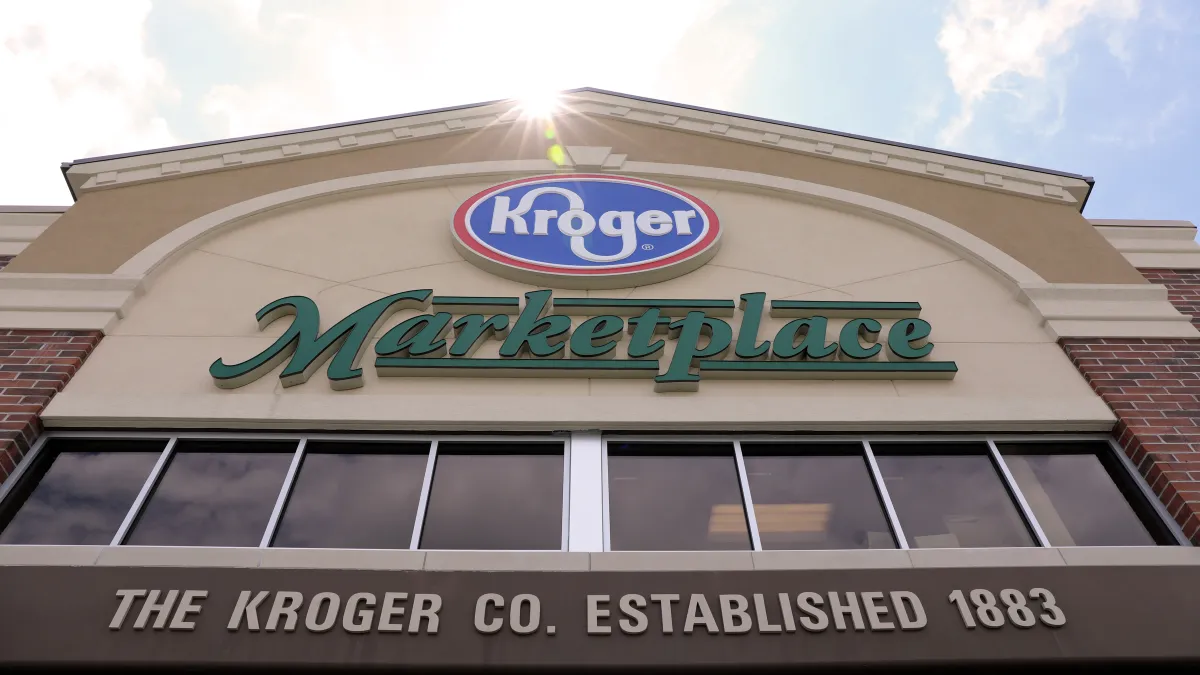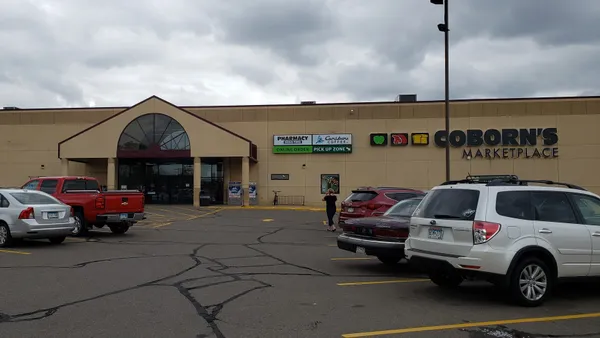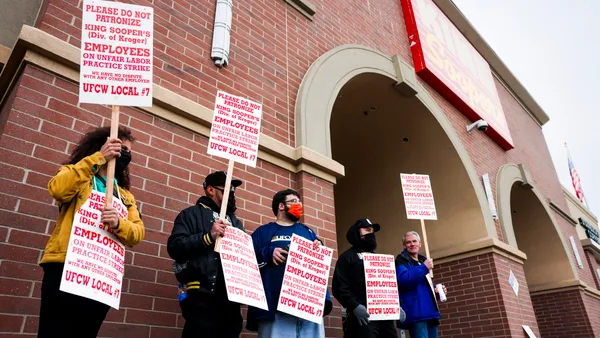Dive Brief:
- Kroger's sales remained well above normal during the third quarter as the pandemic’s impact on grocery shopping habits remained a powerful factor for the supermarket industry. On Thursday, the company reported total sales of $29.7 billion for the quarter, up 6% compared with the same period last year. Comparable sales excluding fuel for Q3, which concluded Nov. 7, were up 10.9%, while operating profit came in at $792 million, compared with $254 million for the third quarter of 2019. Gross margins dipped by two basis points to 23% of sales, mainly due to changes in sales mix and price investments.
- The grocer reported digital sales growth of 108%, contributing 4.6% growth to comparable sales excluding fuel as the channel continues to make a strong showing. "We think the pandemic has accelerated the transition to digital probably by three years or so," Kroger Chairman and CEO Rodney McMullen said during Thursday morning's earnings call.
- Kroger is looking at an attractive financial picture as it closes out the year and looks ahead to 2021. The company expects full-year same-store sales for 2020 to be up about 14% and projects that results next year will be stronger than it would have expected before the pandemic began, Chief Financial Officer Gary Millerchip said in a statement.
Dive Insight:
Kroger’s same-store sales and revenue growth are trending downward after their peaks earlier in the pandemic as competition for consumer dollars evolves, but Kroger remains in a strong position to continue benefiting from the sustained shifts in consumer behavior brought on by the extended public health crisis.
Kroger’s ID sales of about 11% in Q3 compare to 14.6% in Q2 and 19% in Q1, suggesting that while people remain heavily dependent on grocery stores for food and other supplies, the grip Kroger has had on its customer base is loosening.
The grocer's gross margins also notably dropped during Q3 after increasing in the first two quarters of fiscal 2020. Price investments and changing sales mix contributed to the decline, which was partly offset by sourcing efficiencies, sales leverage and growth in alternative profit streams.
Nevertheless, the pronounced at-home eating trend that filled Kroger’s sails this year is likely to remain strong going into 2021 because people’s return to working in office buildings will probably be a slow process, Neil Saunders, managing director of GlobalData Retail, said in an email. The economic downturn brought on by the pandemic could also favor Kroger because it can be expected to cause some consumers to shy away from eating in restaurants, Saunders said.
Kroger also stands to profit from investments in e-commerce it has made this year. The company has had particularly strong success in online grocery in 2020, and the extensive foundation it has installed to meet surging customer demand for pickup and delivery puts it in a good position to compete with other grocers for digital business in the months to come, Saunders said.
“We believe that most food players are currently engaged in a land grab to ramp up their services and secure market share … but [Kroger] is far more advanced on its digital journey than most other supermarkets,” Saunders said, pointing to Kroger’s growing partnership with Ocado to build automated warehouses and improve in-store picking efficiency as advantages for the company.
Kroger expanded pickup to 2,213 locations and brought delivery to 2,468 locations in Q3, meaning that 98% of the households the grocer reaches have access to those services, according to the company’s earnings release. It's also improving the economics of fulfilling online orders, with the cost to fulfill pickup orders improving "by double digits compared to the same period last year," Millerchip said during Thursday's call. Digital fulfillment is currently profitable for the company, thanks mainly to its growth in digital advertising, he said.
During Q3, Kroger launched 250 new private label products — the largest such quarterly increase in its history. This included 50 new Simple Truth Plant Based items. The company's Private Selection assortment grew 17% while Simple Truth, its powerhouse natural and organic line, grew 15%.
To ensure it's ready for elevated demand during the holiday season as COVID-19 cases spike across the country, McMullen said Kroger has boosted its supply lines and increased flexibility across its facilities.
"We have proactively secured an additional 5,000 truckloads of inventory and increased distribution capacity reserves by 20 percent within our supply chain to get ahead and avoid potential supply disruptions," he said Thursday. "Furthermore, we have flexed our national footprint by dynamically shifting volume from constrained facilities and regions to facilities and regions with available capacity to accommodate."
Kroger also highlighted its response to the need for coronavirus testing, noting that its Kroger Health unit has conducted more than 250,000 COVID-19 tests since April.
Jeff Wells contributed reporting to this story.













